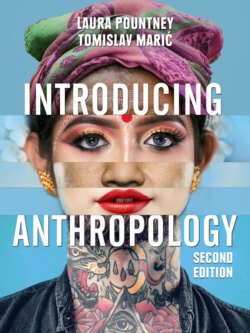Читать книгу Introducing Anthropology - Laura Pountney - Страница 15
Creationism and evolution
ОглавлениеUntil the eighteenth century, religion shaped the dominant explanations for the origins of human life. In Europe, these came largely from Genesis, the first book of the Bible. This explanation, known as creationism, was based upon the idea that God had created all life in six days, and that the characteristics of plants and animals were fixed and unchangeable.
creationism The belief that all life was created by the actions of God
That is not to say there was no interest in the great diversity of animal and plant life. Early scientists showed a strong desire to organize different species and locate human beings within classification systems. For example, the Swedish botanist Carl Linnaeus (1707–78) was among the first to develop a scientific classification of animals and plants, or taxonomy. Linnaeus accepted the biblical explanation of creation, and his classification system is still influential today. This system is based on similarities and differences between species, which Linnaeus argued were part of God’s plan.
taxonomy The classification of organisms in an ordered system that indicates natural relationships
Creationist ideas are not limited to Christianity. Muslim creationists, for example, base their thinking on similar arguments and on passages such as this in the Qur’an: ‘God has created every animal from water. Of them there are some that creep on their bellies, some that walk on two legs and some that walk on four. God creates what he wills for verily God has power over all things’ (Sura 24:45). However, fossil discoveries during the eighteenth and nineteenth centuries challenged the ideas central to creationism by proving that different types of life had existed in the past. Creationists responded to these findings by arguing that various forms of catastrophe had occurred, which they claimed had destroyed other ancient species. This branch of creationists, known as catastrophists, argued that events such as the biblical flood involving Noah’s Ark destroyed ancient species, after which God created new species, leading to contemporary species.
fossil The preserved remains or traces of animals, plants and other organisms from the remote past
catastrophism The theory that the Earth has been affected in the past by sudden, short-lived, violent events, possibly worldwide in scope, which have led to the contemporary world with its current variety of animals and plants
There has recently been a resurgence of creationism. For example, the Discovery Institute, an American nonprofit public policy think-tank, developed a theory known as intelligent design (or neo-creationism). This is defined as a belief that the universe could not have been created by chance and that some higher power must have had a hand in it. The effects of this theory have been felt within both the public and the political sphere. For example, there has been a lot of debate over the teaching of the origins of human life in schools. Some creationists argue that teachers should explain the origins of human life through creationist ideas only.
intelligent design Also known as neo-creationism, the belief that the current state of life on Earth has come about through the actions of an intelligent designer; this designer need not be God, but most proponents of intelligent design seem to have God in mind
